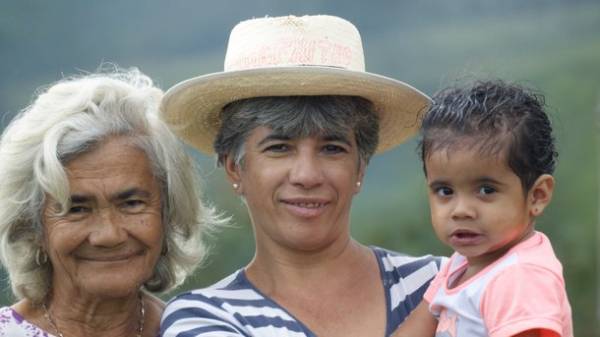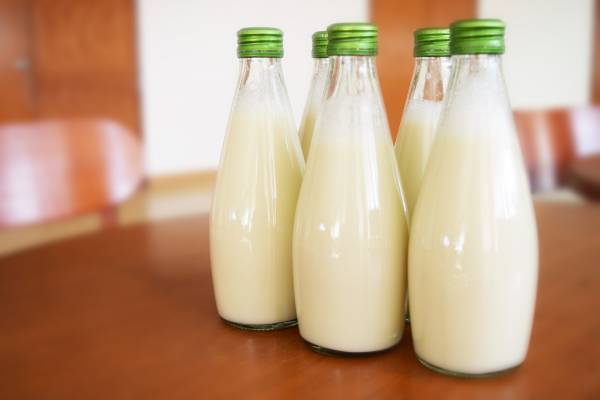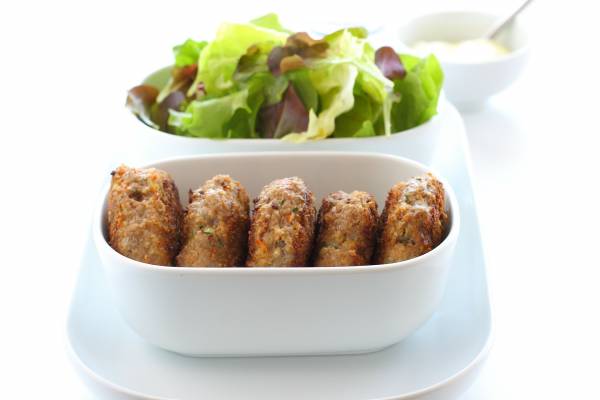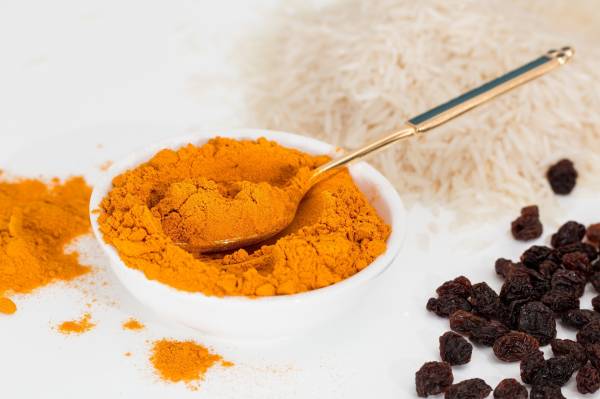
Every day more and more people shift to a healthy diet. But in addition to basic principles, there are also nutrition guidelines by age. What does it mean? This means that, for example, a growing child’s body requires more protein. After 40 years the need for protein decreases, and after 65 increases again. All because in every age in the body there are different processes for optimal operation he needs certain nutrients. Properly chosen diet will allow to prolong youth and to be healthy even in old age. How to make a menu, taking into account age, we were dealing with well-known dietitian, and a member of the Association of dietitians of Ukraine Oksana Skitalinskaia.
The organism grows, proteins and vitamins
The body of the child and the teenager not only actively grows and develops, and is subjected to considerable stress: school, visiting clubs and an endless stream of information. Therefore, the diet should be as varied and balanced, to saturate the nutrients.
- NEED: PROTEIN
Growing body with the necessary “building material”, so the menu should be protein of animal and vegetable origin. Daily dose of about 2 g per 1 kg of body weight (depending on age and physical activity). In the first place — eggs: they contain a unique set of amino acids, lecithin and phospholipids, these substances participate in the formation of brain cells, improve memory. In second place and dairy products. Also include in the diet of the child meat and sea fish.
The main rule — the meat must be lean (chicken, veal, beef) and fish — small (herring, mackerel). The fact that large fish can accumulate salts of heavy metals, and detox system at this age, still runs poorly. But the small fish is very useful: it is rich in omega-3 fats, which improve heart function and memory, have anti-inflammatory properties. The baby needs cereal, especially buckwheat, oatmeal, amaranth, quinoa (they are rich in protein, fiber and valuable fats), and also legumes — green beans, peas, lentils, mung beans (preferably pureed).
Vitamins. The diet should contain vegetables, fruits and berries. They are rich in vitamin C, carotenoids and other colored pigments that are essential for growth and healthy immune system. If children don’t like vegetables, try to cook interesting dishes: for example, vegetable puree of tomatoes, peppers and greens, berry jelly with banana and Chia seeds.
- BANNED: THE DIET
Mono, fasting days, fasting and veganism, the raw food diet and other non-traditional radical system of nutrition. The only thing you can try is lacto-ovo-vegetarianism (a branch of vegetarianism, which consume eggs and dairy products). But the move is possible only with the attainment of 20 years and should be pre-tested!
Liquid sugar. The favorite drink of most of the children sweet drinks. But it contains a lot of sugar, so destroys brain cells. If the child will eat it, eventually the worst start to learn, have trouble sleeping and be irritable. Do not abuse packaged juices and even fresh juice. They concentrate sugar without fiber. Drinking this “solution”, we strike the pancreas, the intestinal microflora, the immune system. So give your baby juice, diluted with water 1:1 and not more than one Cup a day! The healthiest drink is pure water. If the child does not want to drink it, do fruit and berry cocktail: at night drop into the water finely chopped fruits and berries. Will turn out tasty and healthy!

Soda strictly prohibited
20-40 years: arrange fasting days
In this age people are usually full of energy and health, so often eat anyhow. The consequences of this way of life not be immediately apparent, but the chance to cross 40 years old with obesity and disease increasing. So always remind yourself that health reserves are not limitless!
Goodbye milk! Since 20 years, it is necessary to gradually reduce the amount of milk, and then completely abandon it. In the adult human body has insufficient enzymes that would split the whole milk. Milk sugar — lactose — damages proteins, promotes inflammation and premature aging. But the fermented milk product is easily digested and to be useful. Eat dairy products. Especially good if it is genuine yogurt and homemade yogurt. On the day only 1 Cup. You also need to reduce the amount of protein: daily rate should be about 1 gram per 1 kg of body weight.
SEE ALSO
- What food contains the female hormone of youth
To lose too much. From 25 and up to 60 years will be very helpful handling days: it is recommended to organize such at least once a week. Not necessary to starve or exhaust themselves with strict restrictions — enough to give up one meal (e.g. dinner) or eat the whole day only vegetables/dairy products. Such a diet in the literal sense of the words would relieve the body cleanse from toxins and fill the body with energy.

Adults should limit milk consumption
After 65 years: take the example of children
After 65 years contraindicated to arrange a variety of fasting days, to sit on exhausting diets and especially fasting. The main thing is that the menu was missing harmful products and it was well balanced.
The added protein. With age, absorption of nutrients decreases, so after 65 it is necessary to increase the amount of protein. First of all it is necessary to avoid loss of muscle mass, reduce the risk of osteoporosis and cancer. Daily rate — at least 1.5 grams per 1 kg of body weight. It may be vegetable protein: amaranth porridge, buckwheat, quinoa, oats, well cooked meals of lentils, Masha, green peas, beans. Sure — digestible animal proteins: steam cutlets or meatballs is better than a boiled piece of chicken. So try to prepare meals that require the grinding of meat and fish.
Grown beneficial microflora. Particularly necessary for the elderly (and to children) pickled products: cabbage, cucumbers, home-made kvass. They are rich in lactic acid and helping to develop useful microorganisms that live in our intestines and protect the body from toxins and different viruses, maintain healthy liver and brain.
Strengthen memory. Older age, sleep and cognitive abilities (memory, concentration, learning) worse. To improve them, in addition to pickled vegetables and drinks help green leafy vegetables, berries (blueberries, blackberries, black grapes), nuts (daily) and oily saltwater fish — 2 times a week.

Maturity — the time for the cutlets
40-60 years: are protected from aging
It is often in this age range make themselves aware of the disease, especially if to 40 years, you were wrong lifestyle. It is not necessary to wave on their own health: if you start eating healthy food in advance — have all chances to meet an old age in sound mind and good spirits!
The stop time. At the age of 40 years and switch to a variety of foods with geroprotective properties, that is, those that protect the body against the aging process. First and foremost is turmeric, ginger, green tea, high quality filter coffee (one or two cups a day). Do not forget that in this age range often crises occur. To avoid depression and mood swings will help products-antidepressants: dark chocolate with a high cocoa content (at least 80%), olive oil, dark berries, leafy greens, nuts, flax seeds, and foods rich in omega-3 fats (herring, mackerel).
Less meat. With age, the body’s need for protein is reduced, so you need to reduce the amount in the diet. After 40 years of daily dose should be 0.8—1 grams per 1 kg of weight, after 50 years — approximately 0.8 grams. First and foremost, abstain from red meat (pork, beef, lamb), but the fish in the menu, you need to write: fish protein is easier to digest. In addition, this product contains a lot of polyunsaturated fats that protect blood vessels, stimulate memory and improve cognitive abilities.

Turmeric can help to stop aging
5 universal rules
- TO AVOID DAMAGE
Discard products, harmful products from purified white flour, sweets, processed foods with preservatives (sausages, frankfurters, canned), sweet sodas and packaged nectars. Especially sensitive to it children, young people and people after 60 years: in the growing organism is not formed of the digestive and immune systems in old age, the reserves of these systems are declining.
- A MAXIMUM OF DIVERSITY
The diet should be varied. The more different foods you eat, the more nutrients you get. Monotonous diet drives the body into a state of deficit: over time it leads to dysfunction in the organs, depletion of reserves of health and premature aging.
- STICK MODE
Eat not when you want, and at the same time daily. Preschoolers and primary school children can eat 4-5 times a day but as the child grows, it is necessary to reduce the number of meals (3-4 times). Healthy adults should eat 3 times a day more frequent meals often helps to increase the level of insulin in the blood, inflammation and premature aging.
- NO CNG
Note the heat treatment. The most useful method of cooking — boiling or roasting in the sleeve, the harmful — frying. The resulting crisp is advanced glycation end products (CNG), which stimulate inflammation in the body, loss of elasticity of blood vessels, the risk of strokes, heart attacks, kidney disease, cataracts, cancer. Therefore, minimize the use of fried. But if very much want — fry in lard or fat that can withstand heat up to high temperatures and do not change their structure, such as olive oil, but do it very rarely. While cooking, turn food often, and before eating, blot with paper towel excess oil.
- “THE SUNSHINE VITAMIN”
Don’t forget about foods rich in vitamin D, which is necessary for the nervous system, memory, good mood, strong bones and teeth. It can be found in the yolks of the eggs welded soft-boiled, and cod liver (eat it once a week 1-2 tsp), butter 82% fat, 25% sour cream and cream (rather than 1 teaspoon in the finished dish).







